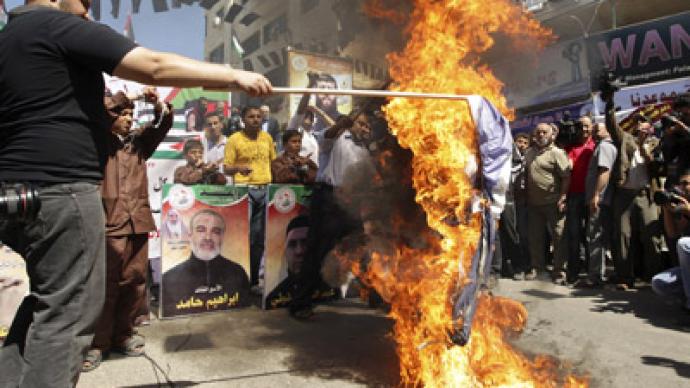3,500 Palestinian prisoners in Israel on hunger strike

The majority of the 4,699 Palestinians being currently held in Israeli prisons refused their meals on Prisoners’ Day, while 1,200 of them promise to hunger strike indefinitely to protest against unfair conditions.
The other 2,300 have refused to eat any food for the whole of Tuesday.Later on Tuesday Israel is to release Palestinian prisoner Khader Adnan, 33, who attracted worldwide media attention after spending 66 days on hunger strike – the longest in Palestinian history.In Palestinian authority practically every person has a relative or acquaintance that has spent or is spending time in Israeli prison. Palestinians consider those jailed as freedom fighters, whichever setup they belong to, be it Hamas, Islamic Jihad or any other Palestinian organization.Israel has 17 detention facilities across the country and the West Bank. According to Israeli data, 3,864 of the total number of prisoners are from the occupied West Bank, 475 are from Gaza and 360 are Arab Israelis or from Israeli-annexed east Jerusalem. The Palestinian data says that 534 prisoners – more than one in 10 – are serving a life sentence.Israeli rights group B'Tselem also gives figure of 203 jailed Palestinian minors, 31 of whom are under 16 years old.Israeli also use an “administrative detention” legislative that dates back to British protectorate of the region. This procedure allows Israel to detain suspects indefinitely without charges being brought against them, simply by repeating the implied maximum six-month periods of detention time after time.At the moment there are 319 persons under “administrative detention” in Israel.Last year the number of Palestinians in Israeli jails considerably reduced after the release of 1,027 prisoners in exchange for captive Israeli soldier Gilad Shalit, a swap deal between Palestine’s Hamas and official Tel-Aviv after years of negotiations.All in all, since 1967, when Israel occupied East Jerusalem as a result of Six-Day War, the West Bank and the Gaza Strip, some 700,000 Palestinians have seen the daylight from behind the bars of Israeli prisons. This is equivalent to 20 per cent of the total population of the Palestinian Authority.













